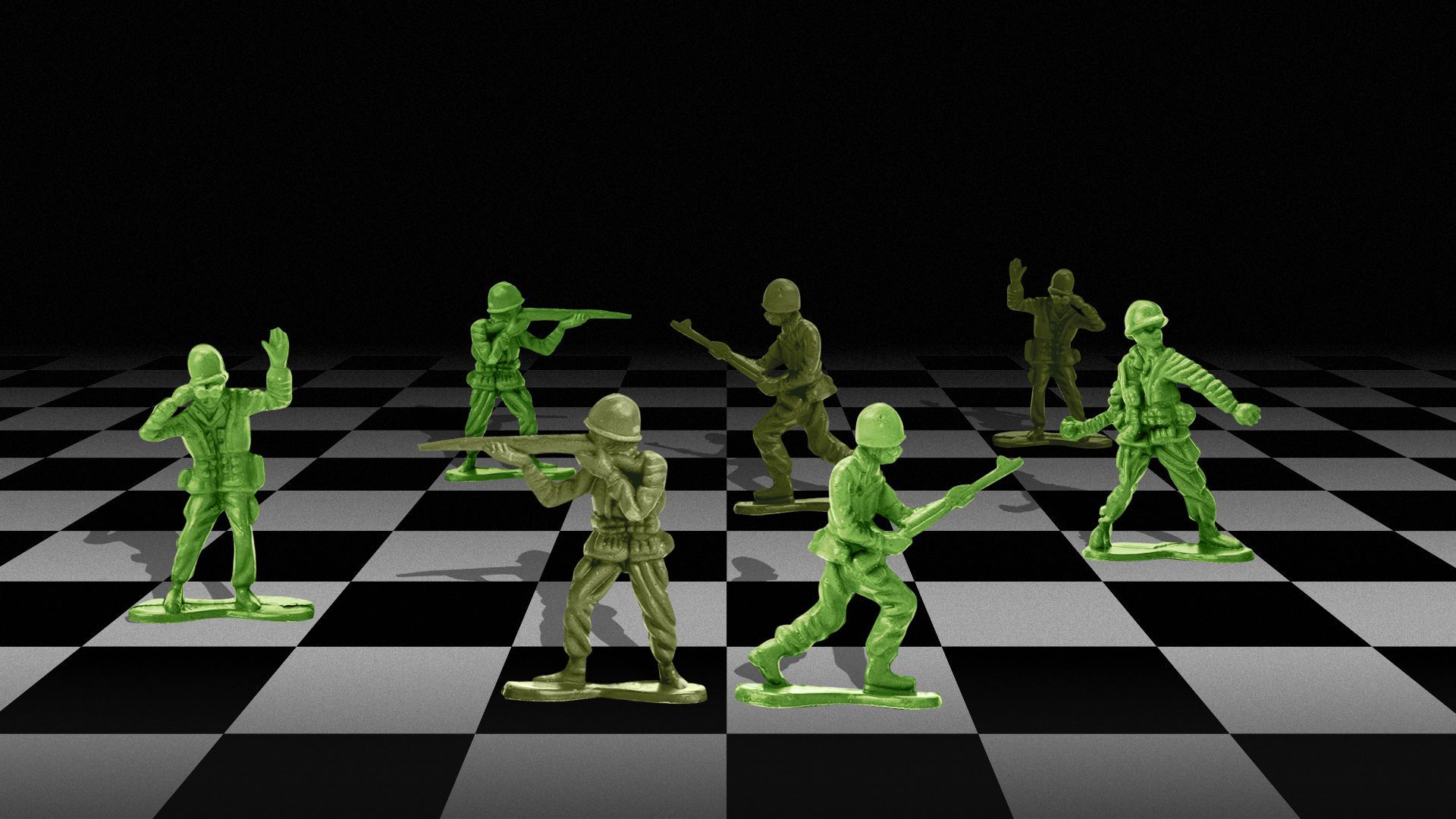U.S. warns China against a superpower proxy war in Ukraine
Add Axios as your preferred source to
see more of our stories on Google.

Illustration: Aïda Amer/Axios
In an "intense" seven-hour meeting with China's top diplomat Yang Jiechi on Monday, national security adviser Jake Sullivan warned of "consequences" if Beijing materially supports Russia's war in Ukraine, a senior U.S. official briefed reporters.
The big picture: China is already providing its most powerful partner with tacit support, but U.S. officials are now trying to draw red lines to prevent a full-on superpower proxy war.
Driving the news: The FT's Demetri Sevastopulo reports that the U.S. has warned allies in a diplomatic cable that China has "signaled its willingness" to provide Russia with weapons. Those include surface-to-air missiles, per the report.
- While China's next moves remain uncertain, fears are growing that Washington and Beijing could end up arming either side in a brutal land war — potentially escalating and prolonging it.
- Far beyond the battlefield, such a move would herald an even more adversarial era in U.S.-China relations, says Hal Brands of the Johns Hopkins School of Advanced International Studies. Sanctions and economic decoupling would "find a new gear," and remaining hopes of a constructive relationship would evaporate.
What they're saying: The U.S. official declined to comment on the potential arms transfers, but said Sullivan shared “deep concerns about China’s alignment with Russia” and warned of the “potential consequences of certain actions” during Monday's meeting in Rome.
- The meeting was planned weeks in advance and also covered other issues like North Korea, the U.S. official said.
- Beijing has denied receiving any request for weapons from Moscow, and it has not armed parties to other recent inter-state conflicts.
State of play: In official public statements, China has presented itself as a neutral arbiter, a defender of sovereignty and international norms, and even a potential peace broker. China abstained from a UN vote condemning Russia, rather than back its most powerful partner.
- While Chinese government spokespeople have blamed the U.S. and NATO for Russia’s invasion — and aren't actually using the word “invasion” — they’re calling for restraint on all sides.
- China’s state propaganda machine has picked sides, however. State media is spreading baseless conspiracy theories about supposed U.S. bioweapons labs, government censors are scrubbing any reports of civilian casualties, and Chinese internet forums are full of support for Moscow and vitriol for NATO, as the Economist’' David Rennie has reported.
- “If you’re Chinese and watching state TV or looking at the heavily censored internet here, you would believe that Russian troops are behaving with extraordinary restraint, that they are there to dislodge Nazis from Ukraine, and that the Americans are the ones pouring fuel on the fire,” Rennie notes.
Between the lines: Chinese President Xi Jinping made relations with Russia a pillar of his foreign policy, and he appeared with Russian counterpart Vladimir Putin before the invasion in a show of solidarity.
- But the war is going badly for Russia on the battlefield and, in particular, in terms of global public opinion. It has united the West and placed additional focus on Taiwan. All of that is costly for Beijing.
- The costs will increase if China helps Russia evade sanctions or offers more overt diplomatic support. They will rise higher still if Xi sends weapons.
- However, Xi may calculate that he needs a strong Russia to occupy U.S. attention and that a catastrophic outcome in Ukraine could destabilize the Putin regime, Brands notes.
The bottom line: Xi's big bet on relations with Putin had been relatively low-risk before now. The U.S. wants to convince him that if he doubles down over Ukraine, he'll come to regret it.

